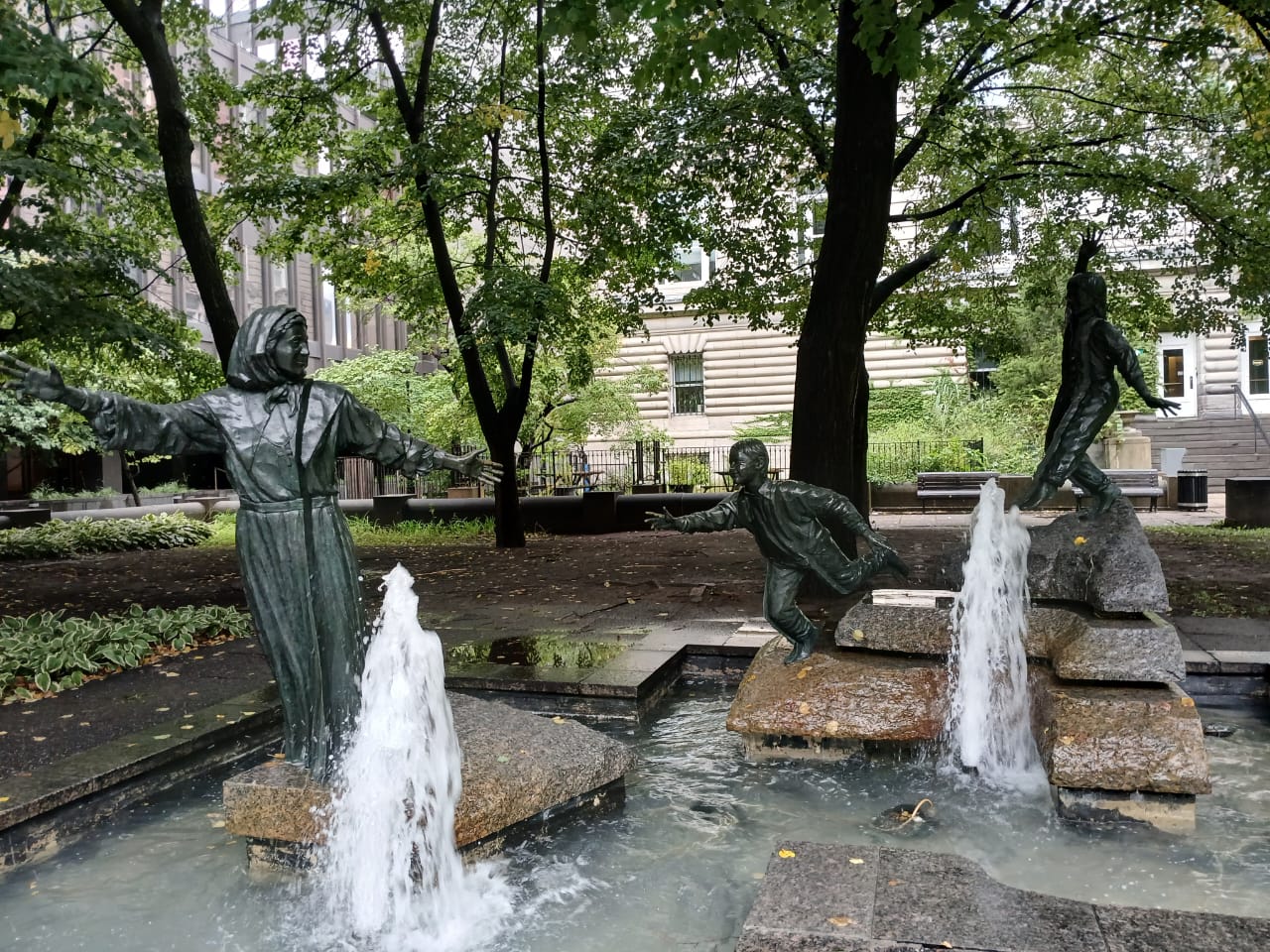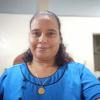
Sculpture of St. Marguerite Bourgeoys in Montreal (Photo: Sandra Sierra)
Recently we held a congregational forum in Montreal, Canada, where we reflected as Sisters of the Congregation of Notre Dame of Montreal on decolonization and racism in today's society, and the effect this has had on us, personally and communally, throughout the centuries since the inception of the congregation by our foundress, St. Marguerite Bourgeoys, in 1653.
It was a very enriching experience that helped us to realize the lights and shadows that we have been experiencing since the beginning. I shared some of my reflections with the sisters, and also took the opportunity to strengthen myself spiritually by visiting the tomb of our foundress and praying with her heart, which is located in a small chapel in our present motherhouse in the city of Montreal.
Decolonization is a complex and multifaceted process that affects not only nations but also individuals. For me, this trip has been a profoundly transformative experience, full of challenges and discoveries. As a theologian and Sister of the Congregation of Notre Dame of Montréal, I have had the opportunity to reflect deeply on how these concepts intertwine with our Christian faith and practice.
My experience on this topic began with an awakening to the history of my country and my own identity. I grew up in an environment where the dominant narrative was that of the colonizers. However, as I learned more about the history of my people, I became aware of injustices and struggles that had been silenced. This knowledge prompted me to question the power structures and seek a deeper understanding of my cultural heritage.
'My decolonization journey has filled me with hope. I have seen how reclaiming our history and culture can empower people and transform communities': Sr. Sandra Sierra
One of the most significant aspects of my decolonization process has been reconnecting with my roots. I began to learn the history of my ancestors, to participate in traditional rituals, and to value the teachings of these cultures for my own life. My initial formation in Guatemala, a multicultural and multilingual country, helped me to go deeper into the knowledge of our ancestors and their worldview, so different from mine, which I can say is more of a western bias.
This reconnection has not only given me a sense of belonging, but it has also provided me with a solid foundation from which I can face the challenges of the present.
The path to decolonization has not been easy. I have faced both internal and external resistance. Internally, I have had to unlearn many of the beliefs and attitudes I had internalized since childhood. Externally, I have encountered opposition from those who benefit from the status quo. However, these challenges have only strengthened my resolve to move forward.
Dialogue with some of our sisters on this topic has allowed me to deepen my understanding of the relationship between faith, culture, politics and economics from a critical and liberating perspective. Decolonization, as I understand it, is a process of liberating peoples and cultures that have been subjected to colonialism and neocolonialism. This process seeks not only political independence, but also liberation from ways of thinking, acting and organizing society that were imposed during colonization.
Advertisement
My decolonization journey has filled me with hope, in spite of the difficulties. I have seen how reclaiming our history and culture can empower people and transform communities. I firmly believe that by continuing this process, we can build a more just and equitable future for all.
From my perspective, it is crucial to critically review our place in the world, that is, the place from which we express our vision of the world. Being aware of where we are situated and the privileges we have had, or the lack of them, invites us to question how our sociocultural circumstances condition our interpretation of reality. For example, if we live in a society that rejects what is different, we are influenced by a culture that denies the other in order to sustain its relationship of domination and discrimination.
During the forum we reflected on various decolonization strategies, such as:
- Education: Review and reform systems of education to include perspectives and knowledge that have been marginalized by colonial history.
- Interculturality: To foster dialogue and respect among different cultures, recognizing the equality of all forms of knowledge and life.
- Social justice and gender equity: Working to dismantle the power structures that perpetuate inequality and promote equity in all spheres of society.
Decolonizing our religious institutions and practices requires a commitment to social transformation and recognition of the plurality of cultural and religious identities. It is a path to freedom that invites us to actively participate in the creation of a world where justice and peace prevail.
Below, I propose some concrete commitments in which we can all collaborate to advance this process of decolonization in our daily lives:
- Learn about the history and cultures of indigenous and other marginalized communities.
- Examine your own prejudices and work to overcome them.
- Practice empathy and solidarity with those facing discrimination and oppression.
- Challenge and transform religious practices that perpetuate inequality and exclusion.
- Evaluate educational content and seek diverse resources that include non-Eurocentric perspectives.
- Use inclusive and respectful language that recognizes cultural and gender diversity.
- Actively listen to people from diverse backgrounds and experiences, and value their stories and knowledge.
- Support local businesses and products, as well as indigenous or marginalized communities.
- Avoid products that perpetuate stereotypes or exploit vulnerable communities.
- Encourage dialogue, reconciliation, and cultural exchange in your community.
- Participate in events and activities that celebrate cultural diversity.
- Get involved in causes that promote equity and social justice.
- Support policies and movements that seek to dismantle oppressive power structures.
Implementing these changes in our daily lives has a cost, and may seem challenging, but every small step counts. At the end of this journey of deepening, I have learned that decolonizing the church and our institutions is a necessary step in building a more just and equitable society. Decolonizing requires a commitment to social transformation and recognition of the plurality of cultural and religious identities. It is a path to liberation that calls us all to actively participate in creating a world where justice and peace prevail.
I trust that we can continue to deepen our understanding of this topic, which is so important for us in consecrated life. The opportunity to attend this congregational forum with my sisters, to meditate, pray and discern, will help us in the future to build ever more intercultural communities that know how to face the new challenges and signs of the times with hope and "eyes of faith," as the Second Vatican Council tells us. We are "pilgrims of the Gospel and bearers of the good news."
This column was originally published in Spanish on Oct. 16, 2024.








